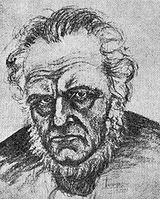
Bólu-Hjálmar
Encyclopedia

Iceland
Iceland , described as the Republic of Iceland, is a Nordic and European island country in the North Atlantic Ocean, on the Mid-Atlantic Ridge. Iceland also refers to the main island of the country, which contains almost all the population and almost all the land area. The country has a population...
ic farmer and poet, known for his sharp style and biting wit and for his mastery of the short Icelandic poetic narrative style known as Rímur
Rímur
In Icelandic literature, a ríma is an epic poem written in any of the so-called rímnahættir . They are rhymed, they alliterate and consist of two to four lines per stanza...
.
Hjálmar was born in Hallandi in Eyjafjörður
Eyjafjörður
Eyjafjörður is the longest fjord in central northern Iceland. It is located in the second most populous region of Iceland.-Physical geography:...
. Born out of wedlock to a servant girl and a farmhand, Jónsson had little formal education, but he soon became an avid reader of the Sagas
Sagàs
Sagàs is a small town and municipality located in Catalonia, in the comarca of Berguedà. It is located in the geographical area of the pre-Pyrenees.-Population:...
and Eddas. He first became a farmer in Bakkinn in Öxnadalur, but subsequently moved to Skagafjörður
Skagafjörður
Skagafjörður is a deep bay in northern Iceland.-Location:Skagafjörður is about 40 km long and 15 km wide, situated between Tröllaskagi to the west and the Tjornes Peninsula to the east. There are two municipalities in the area, Skagafjörður Municipality and Akrahreppur Municipality Skagafjörður...
where he dwelled in Bóla
Bola
Bola, from Spanish and Portuguese meaning ball, may refer to:* Bolas, throwing weapon made of weights on the ends of interconnected cord* Bola , a volcano on the island of New Britain in Papua New Guinea* Bola, Togo...
(Bólstaðargerði), from whence his nickname Bólu-Hjálmar was derived. Hjálmar was a poor farmer, and had difficulty making ends meet. He was constantly engaged in disputes with his neighbours, who accused him of stealing sheep.His farmstead at Bóla is now deserted but a memorial to Bólu-Hjálmar has been erected there in a small grove.
In his own way, Hjálmar was an artistic and creative soul. His style of poetry is marked by economy and clever use of metaphors. Many of his poems are tinged with bitterness, which may partly be attributed to his constant rows and disputes, and partly to what seems to have been a general dislike of humanity.
An example of his bitterness, is this stanza, composed after he had received an anonymous donation. The stanza is the beginning of a longer poem, To an anonymous benefactor:
- Víða til þess vott ég fann,
- þótt venjist oftar hinu,
- að guð á margan gimstein þann,
- sem glóir í mannsorpinu.
The benefactor eventually turned out to be bishop Pétur Pétursson
Pétur Pétursson
Pétur Gudlaugur Pétursson is a retired Icelandic footballer who was active as a forward. He is the assistant manager of KR and the Icelandic national team.-Club career:...
.
He could also be tender, although examples are rare. But this is one, called Mannslát (News of a death):
- Mínir vinir fara fjöld,
- feigðin þessa heimtar köld.
- Eg kem eftir, kannske í kvöld
- með klofinn hjálm og rofinn skjöld,
- brynju slitna, sundrað sverð og syndagjöld.
Here are sorrow and remorse woven together.
He was of course, also a master of rímur
Rímur
In Icelandic literature, a ríma is an epic poem written in any of the so-called rímnahættir . They are rhymed, they alliterate and consist of two to four lines per stanza...
and the associated rímnahættir. One must look far to find a match to:
- Fárleg vóru fjörbrot hans.
- Fold og sjórinn léku dans.
- Gæfusljór með glæpafans
- Grímur fór til andskotans.
This is from Göngu-Hrólfs rímur.
But his talent also exstended to the on-the-spot. This is one example, where he met a rather tragic household on the move:
- Aumt er að sjá í einni lest
- áhaldsgögnin slitin flest,
- dapra konu og drukkinn prest,
- drembinn þræl og meiddan hest.
But Hjálmar could be bested. It used to be a national sport in Iceland to throw the two beginning lines of a ferskeytla at somebody, and the recipient was supposed to complete the stanza or one could play the game with whole stanzas at a time. Once, as he had leaned his skis against a wall and went back to retrieve them, he found they had interfered with a maid's work, and she had put them somewhere else.
Hjálmar found his skis and said to the maid:
- Mínum skíðum vékst úr veg
- við mig stríði hreyfir.
- Þér að ríða þyrfti ég,
- þegar tíðin leyfir.
The maid answered, and for once in his life, Hjálmar was at a loss for words:
- Þínum skíðum vék úr vegi,
- við þig stríði hreyfði.
- Þú mér ríða þyrðir eigi,
- þó að tíðin leyfði.

